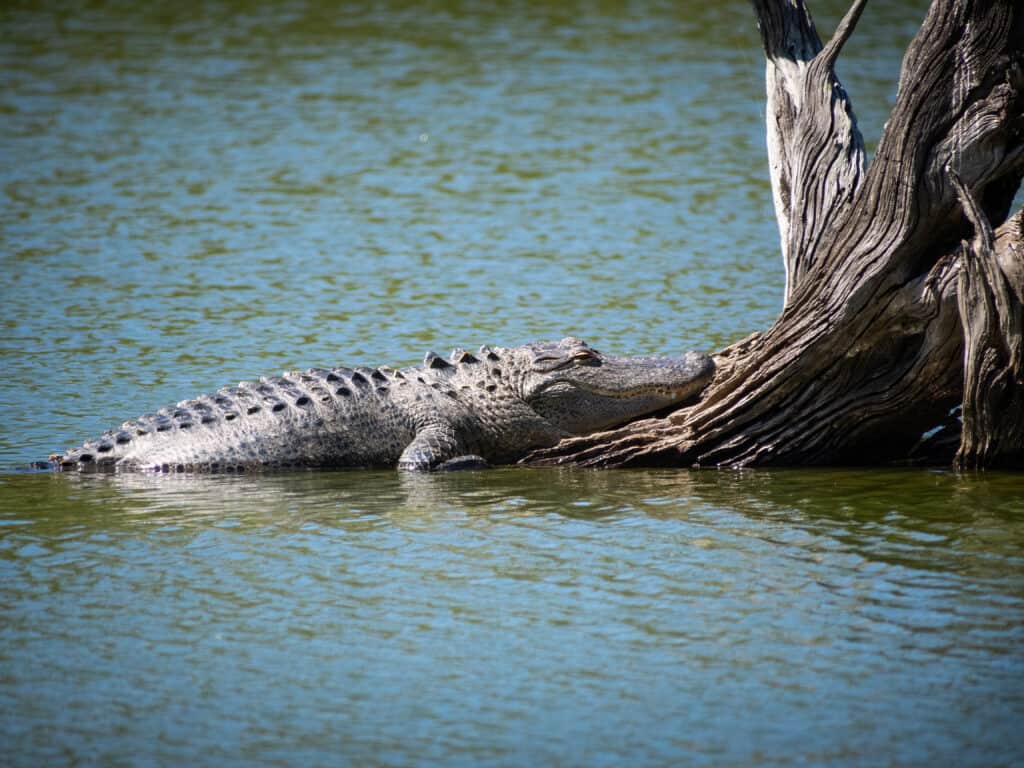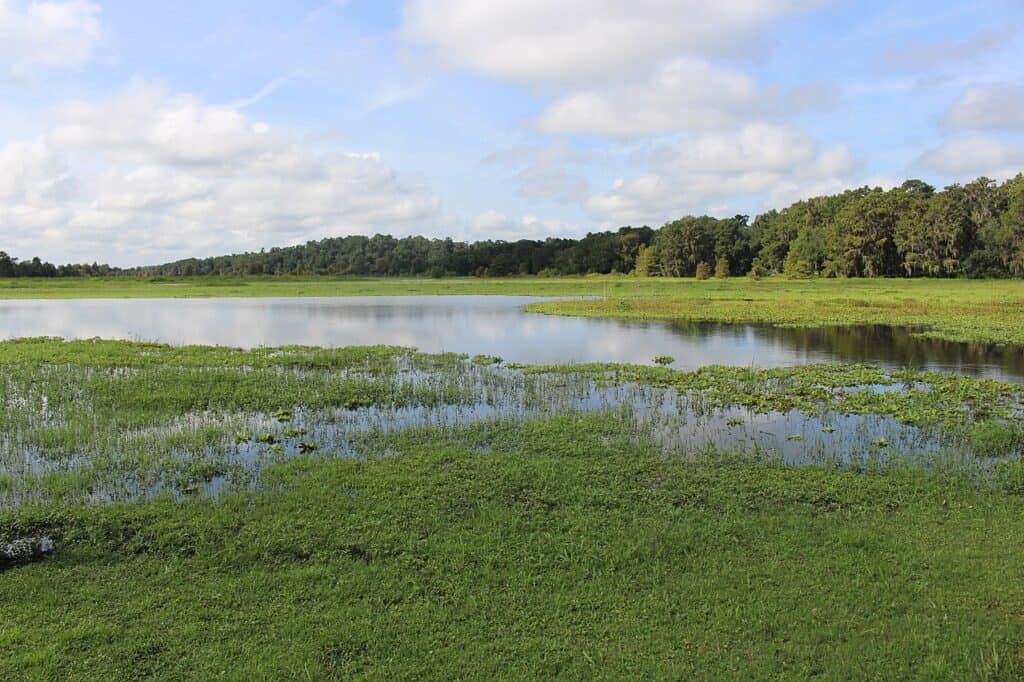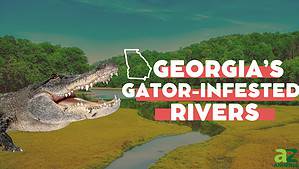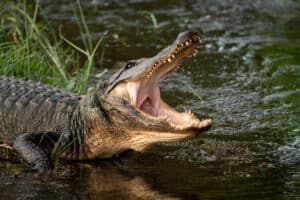When it comes to the American alligator, Florida just might be the gator capital of the world. Gator sightings are common throughout the freshwater lakes and wetlands of this southeastern state. But which one of Florida’s many lakes plays host to most gator sightings?
Here, we’ll discover just how many alligators live in Alligator Lake and why this lake is so perfect for these scaly reptilians. We’ll also learn whether or not it’s safe to swim in Alligator Lake, as well as some basic tips for staying safe around alligators.
Read on to learn whether or not Alligator Lake is the capital of gator sightings in Florida!
Alligator Background

Alligators are among the largest reptiles on the planet.
©Eugenie Robitaille/Shutterstock.com
Alligators are among the largest reptiles on the planet, second only to large species of crocodiles. There are two extant (living) species of an alligator; the American alligator and the Chinese alligator. American alligators are native to the southeastern United States, where they are found solely in fresh water.
Size and Appearance
All alligators start out as tiny hatchlings that emerge from eggs hidden in lakeside nests. Baby alligators have a very high rate of mortality; they’re preyed on by fish, predatory birds, snapping turtles, and even other alligators. But, if they make it to adulthood, they may grow up to 14 feet long and weigh nearly 1,000 pounds.
Like crocodiles, gharials, and caimans, alligators have long bodies with short legs and powerful tails. They’re typically olive green, with yellowish bellies. Scales cover the entirety of their bodies, giving them the appearance of a modern-day dinosaurs. For any that have a gator sighting in Florida, the image is not soon forgotten.
Habitat and Range
Alligators are native to southeastern North America. They live as far north as coastal North Carolina and as far south as the tip of the Florida panhandle. These incredible reptiles live as far west as Texas and can be found in all of Florida’s freshwater lakes, ponds, canals, and wetlands.
Alligator sightings typically happen either when alligators come to land to sun themselves or when they float in the water with only their eyes exposed. As ambush predators, alligators prefer water sources with plenty of covers, like dense vegetation and trees. They’re most likely to be found in shallow, vegetated fresh water.
How Many Alligators Are There in Alligator Lake?

Alligator Lake largely occurs within the city limits of Lake City, and a recent survey conducted by the FWC found just 47 alligators.
©Michael Rivera / Creative Commons – License
So, Florida is home to alligators. But just how many alligators live in the eponymous Alligator Lake? A recent survey conducted by the Florida Fish and Wildlife Commission found just 47 alligators, none of which were large enough to be classified as bull gators.
So, does that mean that Alligator Lake is the capital of gator sightings in Florida? Not quite. Although 47 gators might seem like a lot, it’s nothing compared to the nearly 10,000 alligators surveyed in Lake Okeechobee. But keep in mind that in both cases, these numbers are merely the result of surveys; the actual number of gators living in each lake is likely much higher.
Where Is Alligator Lake Located on a Map?
Alligator Lake is located mostly in Lake City, Florida, in the northeastern part of the state on the Georgia border. Lake City is 60 miles west of Jacksonville.
Why Alligator Lake Is Home to So Many Alligators
Alligator Lake (in Columbia County) actually largely occurs within the city limits of Lake City. Prior to 2002, much of the lake, and its attendant wetlands, had actually been altered for farming purposes. But, beginning in the 1990s, large portions of the lake and the surrounding areas were actually restored to optimal conditions for wildlife.
For the gators, this meant more vegetation, more shore to bask on, and more fish to eat. With all that healthy Florida water and shoreline, it’s no wonder there have been so many gator sightings in Alligator Lake.
Which Florida Lake Has the Most Alligators?

Lake Okeechobee is the most alligator-infested lake in Florida.
©Allison Michael/Shutterstock.com
Lake Okeechobee is home to an estimated 30,000 alligators, which easily makes it the most alligator-infested lake in Florida. Alligator Lake may be home to its fair share of gator sightings, but it’s nothing compared to Lake Okeechobee.
Is It Safe To Swim in Alligator Lake?
Just like all of Florida’s fresh waters, Alligator Lake is home to some of the fiercest apex predators on the planet. There are even bull gators (larger than nine feet long) living in the lake. Therefore, it is not a safe place to swim. However, the lake is a popular destination for fishing—as long as it’s practiced safely.
Staying Safe Around Alligators
One of the easiest ways to stay safe around alligators in Florida is to stay out of the water. But, more than that, it’s vital to stay at least ten feet from the water’s edge. This is especially true if you have pets, which should always remain on a leash. Additionally, no matter how refreshing the water might look, it’s always best to stick to chlorinated, alligator-free pools when you want a dip.
The photo featured at the top of this post is © Thierry Eidenweil/Shutterstock.com
Sources
- , Available here: https://public.tableau.com/app/profile/donovan.myrie3101/viz/FloridaBullGators/Sheet1
- , Available here: https://myfwc.com/fishing/freshwater/sites-forecasts/nc/alligator-lake/
- , Available here: https://myfwc.com/conservation/you-conserve/wildlife/gators/
- , Available here: https://www.jstor.org/stable/3781695
Thank you for reading! Have some feedback for us? Contact the AZ Animals editorial team.






